|
Despite my age and my background, I've never had any dealings with London gangsters, but was once close to someone who did, someone I'm tactfully choosing not to identify, despite the fact that he's unfortunately no longer with us. I discovered that he had these connections after his two teenage daughters and two of their male friends were assaulted in the just-east-of-London town in which I spent my formative years. The boys took quite a beating from the five skinheads who for reasons unknown chose to attack them, and while the girls were just pushed around, they were left badly shaken by the encounter. Then, about a week later, two of the skinheads unexpectedly approached the two girls and made a grovelling apology for what they and their friends had done, before meekly slinking off into the shadows. Only later did we discover that the father of the two girls, who managed a pub that had strong connections to an East End gang and who had grown up on Kray brothers turf, had approached one of these shifty gentlemen who regularly visited his pub and told him of the assault. In case you were unaware, one thing that London gangsters of the day were notoriously protective of was their family, and on hearing of this, the mobster in question sent the word out that these skinheads should be found and dealt with. Part of their punishment was that they had to personally apologise to those they had assaulted. Apparently, the reason only two of them did so was because the other two were still nursing serious injuries. You didn't mess with these people, and you definitely didn't mess with their friends or families.
Years later, when this man's health was fading, we still met for the occasional drink and chat, and it's here I learned more about the gangland figures that were part of everyday life when he was growing up in post-war East London. I remember him complaining about how inaccurately these people were portrayed in film and TV, but there were a small number that he admired. One was Donald Cammell and Nic Roeg's 1970 Performance, whose leading man James Fox was apparently encouraged by Cammell to spend time with actual East London gangsters to help him get a handle on his character, and mob-connected David Litvinoff was hired to act as the film's dialogue coach and technical advisor. Although not as enamoured with the film's second half as I was and still am, he described the early scenes with Chas Devlin, his boss and his colleagues as "absolutely spot-on." He was also a huge fan of The Long Good Friday, and thought Bob Hoskins' performance as Harold Shand was uncannily close to the real deal. (As an aside, when I was at art school, I spent three evenings a week working at a pub in my home town, one whose landlord was the spitting image of Hoskins and who would deal with a fight by wading straight in, pulling those involved apart, and balling them out with such ferocity it stopped any further violence in its tracks.) But his favourite was always Get Carter, for it's gritty realism, for its believable hoods, for its no-nonsense approach to violence (something he also admired in Performance and The Long Good Friday I should note), and for Michael Caine's riveting central performance as the titular gangster. Only in the recent years has popular critical opinion seemingly caught up with the views of a man who clearly knew more about this world than he was prepared to reveal.
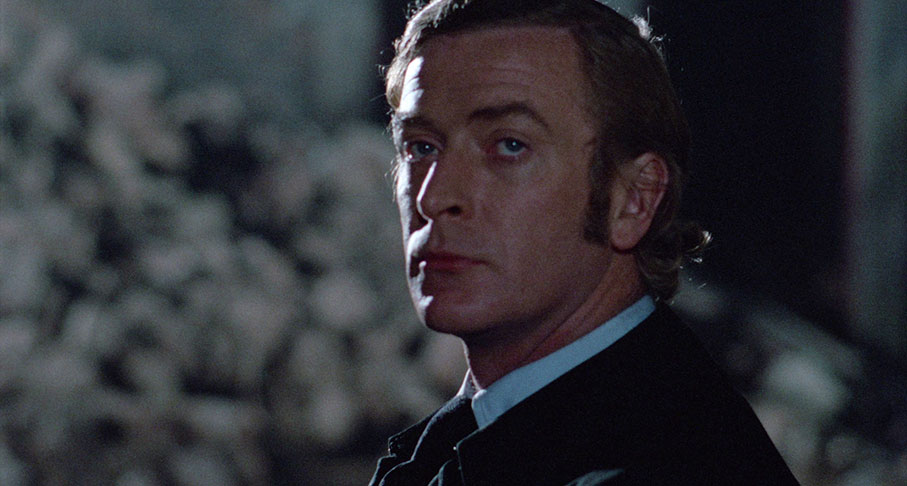
With Get Carter now regularly cited as a British gangster classic, it's nigh-on impossible to come to it not knowing in advance just what it's lead character, Jack Carter (Michael Caine), does for a living, despite the fact that it's heavily inferred rather than explicitly stated. As the film begins, Jack is in the company of brothers Sid and Gerald Fletcher (John Bindon and Terence Rigby), who are having drinks with Jack and Gerald's wife Anna (Britt Ekland) whilst watching a pornographic slideshow.
Okay, I'm going to pause for a second here to wonder how the hell this section made it past the British censor of the day. I know the heads of the onlookers are blocking our view of the full content of these slides, but the second and third images that we do catch partial glimpses of contain clearly visible and uncensored hardcore material. As far as I'm aware, this was still a serious no-no in British cinema back in 1971 – I briefly suspected that this material had been reinstated for this new 4K restoration, but no, it's there on the previous Blu-ray release too. Anyway, back to that deceptively low key opening.
We quickly realise that Sid and Gerald are gangsters from their conversation and demeanour, and they really look the part – put these two in the same room as Harry Flowers and his gang from Performance and you'd have trouble telling who was from which crew. In-between commenting on the slides ("Must be a bloody contortionist!"), they tell Jack that they don't want him to go up north. He works for them, he's reminded, and they have connections with the Newcastle mob, connections they're worried his arrival in the city might disrupt. "What you going for?" asks Gerald. Jack's reply is intriguingly lacking in detail. "To find out what happened." We soon learn that Jack's brother Frank is dead, that the police seem satisfied that it was an accident, and that the Newcastle boys don't take kindly to outsiders poking their noses in. "They're killers," Jack is reminded, "Just like you." It's a comment that Jack doesn't even react to. "Think again, Jack," Gerald advises. "I will," says Jack. Cut to Jack on board a train heading north to his former home in Newcastle, and a whole world of probable trouble.
The effectiveness of this setup lies partly in its economy, with everything you need to know dropped casually in conversation and never having the ring of forced exposition, like an introductory textual scroll that plays in your subconscious. Once in Newcastle, Jack visits a pub, and here we learn something more about him simply from the way he orders a drink. When he walks up to the bar, his outsider status is visually illustrated by the way he seems to tower above the other customers, and after briefly scanning the room, he attracts the barman's attention simply by staring at him silently until the man gets up and walks over to serve him. He orders his drink – "A pint of bitter" – without either rudeness or politeness, then snaps his fingers three times and points, adding coolly, "In a thin glass." There's no emotion expressed, and an almost mechanical air to his actions and words. It's a small thing, perhaps, but it suggests from the outset that Jack is someone who has precise needs and wants, and doesn't waste words or energy on even the most casual encounters. Only when a phone call comes into the bar for Jack from a woman named Margaret (Dorothy White) does he show any hint of irritation, as he demands to know why she's not here to meet him. The brief conversation that follows drops small clues about story threads that will be clarified later, and is then cut short when Margaret abruptly puts down the phone.
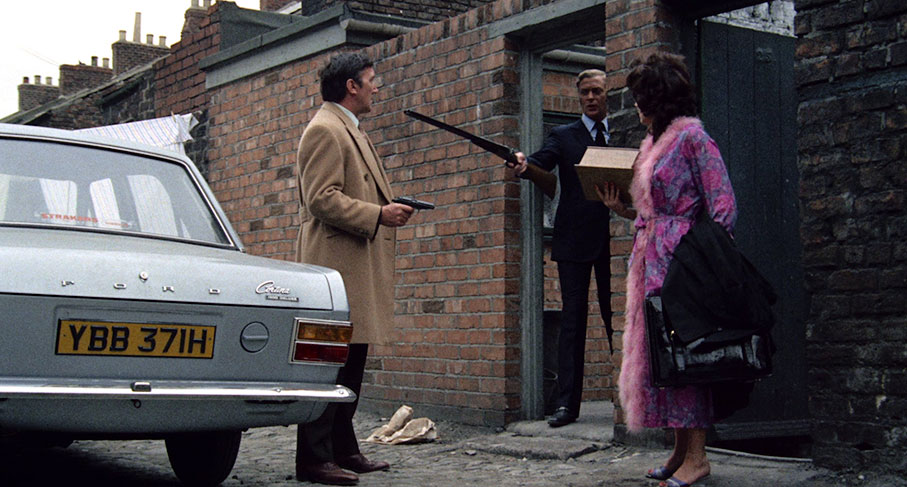
When Jack visits the family home, he finds his brother lying in state but with no-one in attendance. Whilst there, he realises he's being watched from outside, and when he finds a double-barrelled shotgun sitting on top of a wardrobe, he locates a box of shells and puts both aside for possible later use. After paying his respects to his brother, he takes a room at a bed and breakfast house run by world-weary landlady Edna (Rosemarie Dunham), then prepares for the funeral, to which he rides with two of Frank's friends, Keith (Alun Armstrong) and Eddie (Godfrey Quigley), and Frank's teenage daughter Doreen (Petra Markham). Initially, they are the only ones at the service, but the Margaret of the earlier phone call sneaks in at the back as it begins. When it concludes, she tries to slink away but is approached and restrained by Jack. It's then that we learn that she was Frank's girlfriend, and she's clearly not keen to talk to Jack and claims that Doreen's future welfare is nothing to do with her. In the pub afterwards, Eddie floats the idea that maybe Frank took his own life, which is quickly dismissed by Keith and infuriates Doreen, who throws her drink over Eddie and storms out. By now, however, an altogether different possibility has been suggested when Jack asks Margaret directly, "Who killed Frank?"
By this point, we're just 20 minutes into a 122 minute film, and not only have I skipped some of the information dropped in passing, but when it comes to the plot and the characters, we're still getting warmed up. We've yet to meet Thorpe (Bernard Hepton), a bespectacled messenger sent with two goons by persons unknown to ensure that Jack returns to London that very hour, and who ends up having his balls twisted painfully for his trouble. Then there's Brumby (Brian Mosley), a wealthy businessman towards whom Jack is pointed by Thorpe and who initially appears not to be the man Jack is looking for. It's to him that Jack delivers what may be the film's most famous line of dialogue,* before effortlessly deflecting an attempted punch, slapping him a couple of times and calmly taking his leave. There's Newcastle gang leader Kinnear (played with wonderfully smarmy and unflappable self-confidence by Look Back in Anger author John Osborne), whose heavily guarded home Jack is able to slither his way into but whose intrusion doesn't seem to bother Kinnear in the slightest. There's Kinnear's driver Eric (Ian Hendry), whose false friendliness towards Jack when they first meet is obliquely suggestive of their past history together, and Kinnear's woman Glenda (Geraldine Moffat), whose flagrant flirting with Jack is ignored by the man we presume is her husband or lover and who later comes to his rescue in the closest the film comes to a Deus ex machina moment. And then there's Con (George Sewell) and the psychopathic Peter (Tony Beckley), two hoods sent up to Newcastle by the Fletchers to bring Jack back to London when he starts stepping on a few too many toes. Still with me?
Coming back to Get Carter for the first time in several years, I was particularly struck by how it breaks with what has become a perceived wisdom when it comes to gangland thrillers by being almost completely devoid of action and violence for the first 42 minutes of its run time. True, one of Kinnear's guards gets bopped on the head with a log, and Brumby gets slapped, but we're over a third of the way into a film that has a reputation as the finest of all British gangster movies, and all we've really seen is characters travelling and conversing. It shouldn't theoretically hold our interest for that long without delivering just a taste of possibly livelier things to come, but it does. It really does. Unlike so many of the ever-impatient thrillers of today, Get Carter is not in a hurry. It doesn't need to be. It's not an action thriller, and that whole first third is driven by mystery and intrigue. Jack knows even before he steps on the train and heads north that something is not right about his brother's death, and the more he looks into what happened to him, the deeper the hole he seems to be digging for himself, making enemies not just of the locals but potentially his own employers.
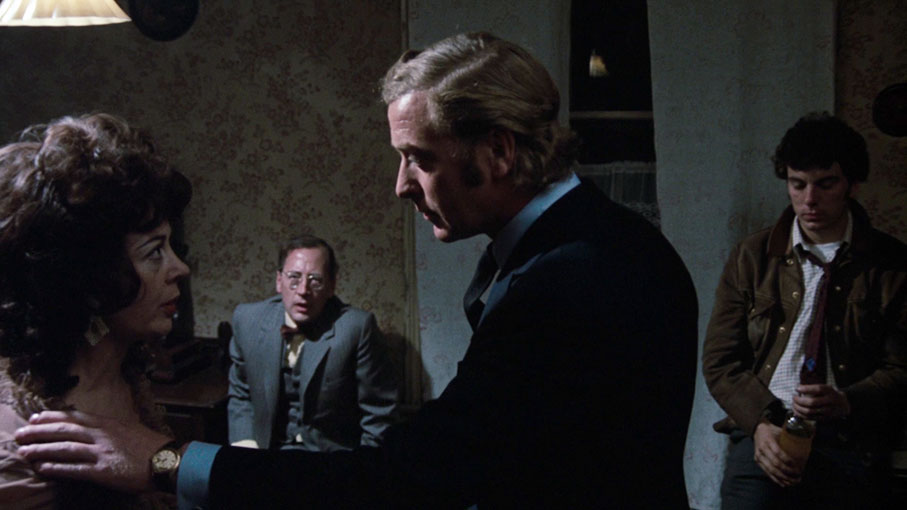
Central to why this is so captivating is Jack himself. A professional hitman for the Fletcher brothers' mob, he calculates every move with machine-like precision and remains level-headed and unflappably cool even when in the midst of a furious gunfight. Comparisons have been made to Alain Delon's ice-cool hitman in Jean-Pierre Melville's Le Samouraï and Lee Marvin's Walker in John Boorman's Point Blank (both 1967), and these are well founded. Michael Caine is crucial casting here, as he gets under the skin of Jack Carter and clearly understands what it is that makes him tick, how his years of experience as a professional killer have effectively deadened his emotions and honed his ability to read a situation and manipulate it to his advantage. Thus, when trouble follows Jack back to his boarding house, his cheerfully flippant comments to Edna are part of a well-practised routine designed to deflect and ultimately deflate her fury. When he climbs the stairs to his room to interrogate Thorpe and she angrily shouts after him, "I'll call the police!" and he casually responds, "No, you won't," he's already weighed her and the situation up and completely dismissed the likelihood of her doing so. When he later seduces her, he's already made the calculation that she will not resist, based in part on what he observes when he has phone sex with Gerald's wife Anna (with whom he is having an affair) whilst Edna sits nearby, looking away distractedly and rocking steadily back and forth her chair in a symbolic representation of a sexual act.
Get Carter was writer-director Mike Hodges' debut feature, but he'd already made a name for himself in television by then, notable with his work for current affairs show World in Action and the ITV Playhouse dramas Suspect (1969) and Rumour (1970). He handles his first feature like a confident veteran, working in perfect harmony with cinematographer Wolfgang Suschitzky to give every scene a gritty and realistic feel. This was the first film to be shot entirely on location in Newcastle and Tyne and Wear, in houses and streets that have a cloudy glumness that feels as much a reflection of the mood of its characters as it is of the city in which they live and operate. Particularly impressive is Hodges' handling of violence, which is sharp, unglamorous and brutally realistic, and I'm saying that as someone who saw my unfair share of fights and physical assaults in my younger days. He's aided considerably here by veteran editor John Trumper (who also edited The Italian Job, a previous hit for leading man Michael Caine), whose razor-sharp cutting of the sequence in which Jack quickly disables the two thugs accompanying Thorpe makes it seem that we've seen more than we really did. Hodges also textures many scenes with interesting detail, from the majorettes and marching band parading the street in which a naked Jacks sees off interlopers with a shotgun, to the female pub singer who gets into a ferocious brawl with a rival when she kisses the wrong man.
As an antihero, Jack initially engages audience sympathy through the simple fact that he is just one man seeking justice for his brother, and up against uncooperative people who all have their reasons from wanting him gone. As the story progresses, however, it becomes increasingly clear that Jack's profession has taken an electromagnet to his moral compass and all stripped him of empathy for the misfortune or suffering of others. There's also a nagging suspicion that his quest to uncover what happened to Frank is driven less by any love he may have had for his brother than the afront his possible murder represents to the family. His solution to seemingly every small problem is to try and buy it off by handing the wronged party a few notes from the wad he carries in his pocket, seemingly in the belief that a simple cash donation will put everything right. The coldness of this particular trait peaks when Keith, whom Jack seems to have befriended, is kidnapped by local mobsters, news of which fails to move Jack in the slightest. When he later tracks him down to the house in which he is nursing his injuries after taking a serious beating, it's not to apologise but press him for more information, something the furious Keith has no intention of providing. Jack's response once again is to offer him money. "Stuff it!" Keith barks at him, but Jack calmly peals of a couple of notes anyway, tossing them on the bed and telling him, "Here, get yourself a course in karate."
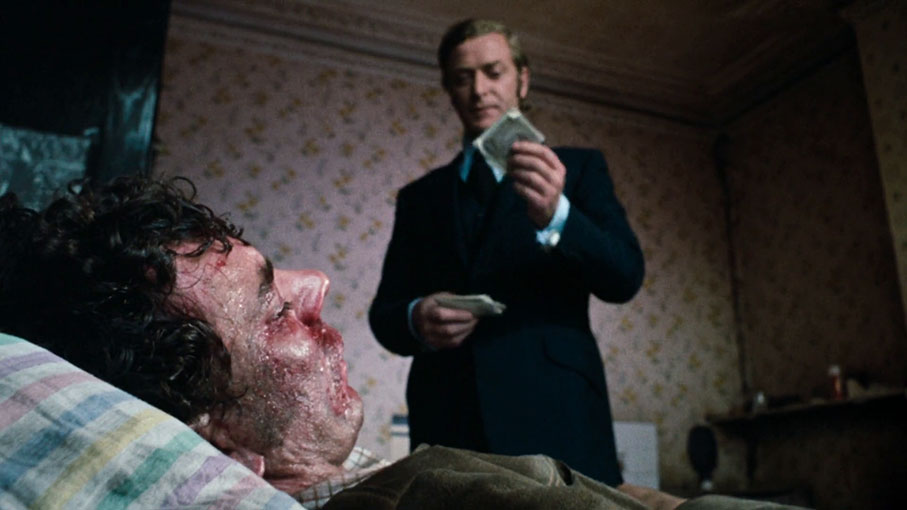
The one person Jack seems to genuinely have some affection for is Frank's daughter, Doreen, and even then there's a possibly selfish motive behind his concern. This is spelt out when the injured Keith furiously berates Jack for screwing Frank's wife, adding, "The poor bastard didn't even know if the kid was his!" It's likely this suspicion that Doreen might be his own daughter that is behind the invitation he makes for her to come and live with him and his fiancée when they move to South America, another conversationally dropped nugget that suggests that Jack is planning to soon put his life of crime behind him. Given the pall that hangs over him from the moment he steps off the train in Newcastle, that's about as optimistic as a movie cop who cheerfully proclaims that he is just two days from his looked-forward-to retirement. Jack's bond with Doreen is also central to the film's cruellest twist, one that triggers the first true emotional response that we see him express, and which refocuses his desire for vengeance in a way that unleashes the dangerous and amoral operative lurking beneath his otherwise coolly controlled and calculating surface.
Rewatching Get Carter after such a long break, especially looking as good as it does on this UHD (see below), proved to be a genuinely invigorating experience. So regularly does it find itself on polls of great British movies (this wasn't always the case, I should note) that it's easy to become a bit blasé about its qualities, at least until you sit down and watch it again and realise that every great thing said about it is richly deserved. Everything clicks here. It's superbly structured, with memorable dialogue that is also believable, and is built around a terrific central performance from Michael Caine and consistently excellent support from a cast of fine actors who make every role register, no matter how small. Hodges directs like a man who has been sitting on a passion project for years and has been given the keys to the low budget movie kingdom, and let's not forget Roy Budd's superb, instantly recognisable main theme, whose electric harpsichord riff follows Jack through the story like the ghost of his lost brother. Every time I come back to the film it just seems to get better and better, and while the final twist no longer hits me as hard as it did on my first viewing back in my teens, it still packs a punch and brings the film to a grimly logical close. So is it the greatest British gangster movie, as many have claimed? Maybe. It's certainly one of them. I still have a very personal connection to The Long Good Friday, and still adore Performance and the original 1948 Brighton Rock, but if you want to champion Get Carter over John Mackenzie's masterpiece, you'll get no serious argument from me.
A film as visually gritty as Get Carter might seem an odd choice for the BFI's third UHD release, but the resulting transfer absolutely justifies that decision. Newly restored in 4K from the original camera negative by the BFI, the 1.85;1, 2160p image is a clear step up from the transfer on previous Warner Blu-ray release, and that was no slouch. The most obvious improvement is in sharpness and detail definition, with seemingly every pore visible on some facial close-ups and crisply defined lines on cars or machinery. The deliberately dour exteriors, use of natural lighting and high-speed film stock do combine to prevent the image from popping from the screen in the manner of a brightly lit Hollywood feature, but detail is really well defined, and the film grain, while visible, is finer than I would have expected, given the stock used. Although clothing and locations tend to be deliberately drab, the brighter colours are richly reproduced when they do appear, and while the contrast has punch, the HDR retains a lot more shadow detail than the transfer on the Warner Blu-ray. As you would expect, the image is spotless and rigidly stable in frame. Frankly, it looks superb.
The Linear PCM mono 1.0 soundtrack is also in excellent shape. It may not quite have the dynamic range of later works – no LFE bass wallops here – but the clarity and fidelity of the dialogue, music and effects are top-notch for a film of this vintage. Again, there are no traces of wear or damage.
Optional English subtitles for the deaf and hearing impaired are available.
Note that the film can be played with or without a newly-filmed introduction by Michael Caine.
DISC 1 – UHD
Audio Commentary by Mike Hodges, Michael Caine and Wolfgang Suschitzky
Sourced from an earlier DVD release (a comment made at the end suggests this was recorded in 1999), this commentary track by director Mike Hodges, lead actor Michael Caine and director of photography Wolfgang Suschitsky is an absolute treat for anyone remotely interested in the film and its production. Structured in the manner of Criterion commentaries, with all three participants recorded separately and edited together, the lion's share of the talking is done by Hodges, with occasional contributions from Caine and Suschitzky. No way is this a cause for complaint, as Hodges proves to be an absolute torrent of information and stories about the shoot, hardly pausing for breath and with a keen memory for even the smallest detail. Areas covered by him include Roy Budd's main theme and his reuse of a single distinctive leitmotif, how making a movie is like playing poker, Ian Hendry's drinking and their genuine fear that he might die on them, the casting of John Osborne and how much he enjoyed playing the role of Kinnear, his involvement in selecting all of the extras, the evolution of the phone sex sequence, the brilliance of Michael Caine's performance, his shock when he learned that Caine couldn't drive just before shooting a scene where he was required to do so, and so, so much more. Suschitzky's contribution includes the challenges of shooting in small locations and hiding lights, the use of particular lenses and the fastest film stock they could find, the different way you handle contrast when shooting in colour as opposed to black-and-white, and the problems of shifting lighting conditions when shooting on location. Caine chips in with an anecdote about a professional hitman who told him he thought the film was crap, and talks about basing Carter on a number of people that he knew, the realism of the violence, his theory of the two styles of acting for the camera, and more. Hodges also relates the full story of the redubbing of the voices of the Fletcher brothers in the opening scene for the American release, and points out that while the original voices are on the soundtrack of the film, the dubbed ones can be heard in the background on this commentary track. I'm just scratching the surface here. One of the best commentaries I've listened to in a long, long while.
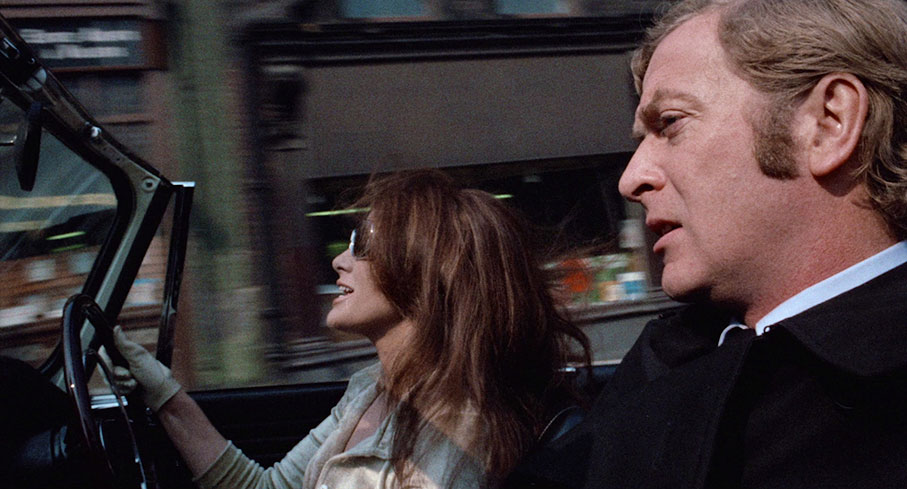
Audio Commentary by Kim Newman and Barry Forshaw
In this second commentary, which is new to this release, novelist and author Kim Newman and author of British Crime Film Barry Forshaw provide an equally busy enthusiasts' view of the film and its production. Forshaw nails his colours to the mast at the start by proclaiming this the best of all British gangster films, while Newman suggests it's more a film about gangsters rather than a gangster movie, and is closer in tone to Jean-Pierre Melville's Le Samouraï, and both note parallels to John Borman's Point Blank. The two men bounce off each other engagingly and cover a considerable amount of ground, including Ted Lewis's source novel and its sequels, the lead actors (particularly Caine and Ian Hendry), the British gangster's attachment to his family, the notion that this is not a misogynist film but a film about a misogynist world, Mike Hodges' varied career and his follow-up film Pulp, Roy Budd's score, British critical reaction, and lots more. Forshaw notes that Michael Caine's performance is as important to the success of the film as Mike Hodges' direction, and Newman wonders why a film that is essentially about a character circling the drain is so much fun. Another excellent companion to the film.
Also included on the first disc is an Isolated Music Track, which enables you to listen to Roy Budd's score – when it appears, of course – without any accompanying dialogue or sound effects. The audio quality is strong here.
DISC 2 – BLU-RAY
Mike Hodges in Conversation (60:13)
Recorded at a live event recorded at the BFI Southbank, London, in May of this year, Mike Hodges is interviewed by Samira Ahmed and looks back over his career as a filmmaker. Despite being almost 90 years of age at the time of recording and needing assistance to reach his seat on the stage, Hodges' mind is sharper than mine probably ever was, with a still keen memory for seemingly every detail of his fascinating career, and relating stories with enthusiasm and wit. He goes into considerable detail about how his first job in television as a teleprompter operator started him on a path to directing episodes of World in Action and arts programme Tempo. He reveals that he went into the Navy in his youth as chirpy young Tory, but that what he saw in his travels transformed him into a rabid socialist, which informed his subsequent documentary work and his determination to ground Get Carter in reality. Several of his early key works for television are discussed, as is Get Carter when the timeline being followed arrives at this turning point of his career. He also discusses at fascinating length his experience on some of his subsequent feature films, including The Terminal Man (1974), Flash Gordon (1980), Black Rainbow (1989) and Croupier (1998), at which point he notes that lead actor Clive Owen is in the audience. There are a few audience questions, which are captioned rather than heard, one of which asks about Hodges' brief spell helming Damien: Omen II. "Thank you for bringing that up," he says with just a whiff of sarcasm, prompting audience laughter before he outlines why he initially took the job and why he left the project. He also reveals that he was offered The Omen but thought the script was terrible, then salutes Richard Donner for transforming it into such a good film. A hugely enjoyable and revealing extra.
Klinger on Klinger (24:09)
Tony Klinger, the son of Get Carter producer Michael Klinger and also a producer and director of note himself, provides an engaging insight into his father's fascinating journey from nightclub manager to independent cinema owner to documentary and feature film producer. He confirms that everyone in his family thought the script for Get Carter was something special, and outlines how the stars aligned when it came to finding a director and securing funding, confirming Hodges' claim that it was just 37 weeks from reading the source novel to the finished film. He notes that the film didn't always have the degree of love that it has since accrued, and that it is now regarded not just as one of the best British gangster movies, but one of the best British films, period.
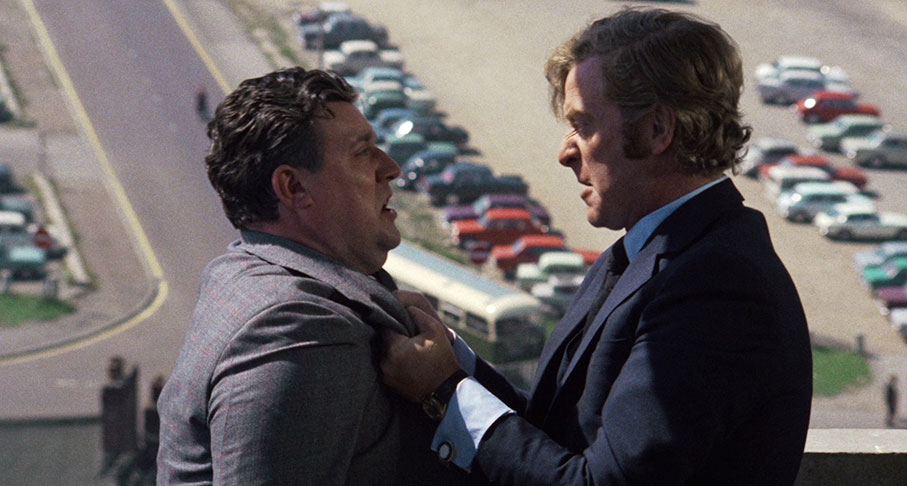
Don't Trust Boys (21:53)
Actor Petra Markham, who played the teenage Doreen in Get Carter, looks back at her career on stage and screen, noting early on that she didn't so much pursue a career in acting as slide into it. She reveals that her young looks meant that she was still playing teenagers in her late twenties, and recalls her work on Get Carter, specifically the friendly encouragement she received from Caine, not knowing how the drink-throwing scene would play out, and shooting a scene I can't describe without delivering a spoiler. She admits that it was 20 years before she felt able to judge the film, salutes the work of cinematographer Wolfgang Suschitsky and imitates his voice, and opines that the three things you need for acting are relaxation, concentration and infatuation.
The Sound of Roy Budd (17:07)
Film music expert Jonny Trunk looks back at the career of composer Roy Budd, first outlining how he first became interested in film music, how this led to him founding Trunk Records to release previously unavailable film scores, and how he first discovered Get Carter though a screening on Moviedrome hosted by Alex Cox. The previous unavailability of the Get Carter score is explored, as is the construction of the iconic main theme, and the revelation that Budd was a musical prodigy (he apparently played at the London Palladium at the age of ten) makes it all the sadder that he spent his final years playing piano in often empty London cocktail bars. It's here, however, that Trunk was able to meet him and discuss his work, as well as have him sign the rare 7" record release of the Get Carter theme that hangs on his wall behind him.
BBC Look North Location Report (4:48)
Surviving footage of a 1971 report on the making of Get Carter, from the BBC's regional news programme, Look North. This includes words from the presenter, brief interviews with producer Michael Klinger – who rather wonderfully sounds like he could have played one of the Fletchers' boys in the film – and the rather posher accented production supervisor, Robert Sterne, who outlines the logistical challenges of shooting a big film on location. Perhaps most valuable of all are the brief shots of the crew at work and the footage of a relaxed and chatty Michael Caine between takes.
The Ship Hotel – Tyne Main (33:26)
A narration-free documentary, made by Philip Trevelyan in 1967 whilst at the Department of Film and Television at the Royal College of Art, about a pub named The Ship Hotel located on the bank of the River Tyne. More interested on capturing the atmosphere of the venue and the surrounding area than telling a story, it makes evocative use of close-ups, and Trevelyan does a good job of making the camera feel invisible to the patrons as they drink, converse, play dominos, and sing. A couple of sequences have clearly been staged, notably a romantic assignation on a grassy hilltop, which is covered from several angles by a tripod-mounted camera, and anything involving the male half of this duo and his car, which pulls up or moves through the frame with feature film precision. There is also a sense at times that Trevelyan was struck by just how much the locals smoked, as he misses no opportunity to show them lighting up or taking a drag, or framing cigarettes or stubs in huge close-up. One word of warning – those not familiar with the Geordie accent and dialect may struggle to understand much of what is being said or sung (I certainly did). This is not helped by the narrowness of the soundtrack's dynamic range and the absence of subtitles, but ultimately does not detract from what is essentially an observational work.
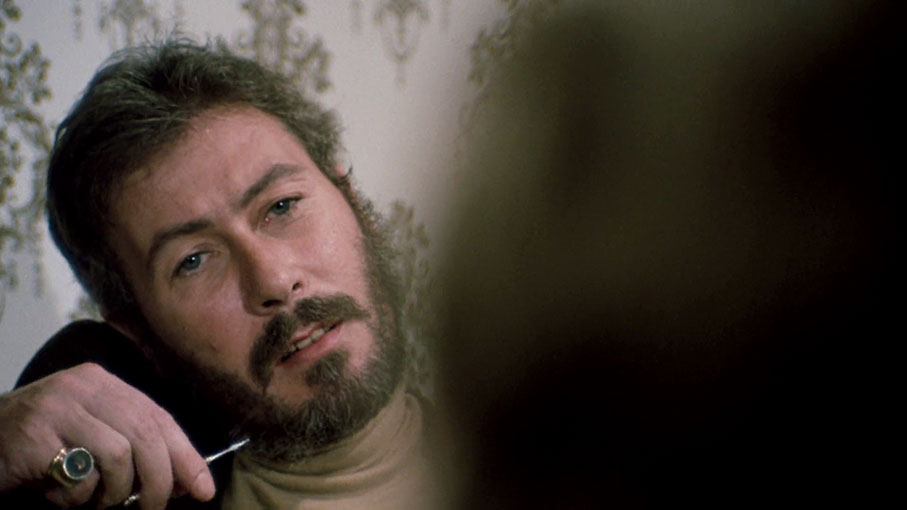
Michael Caine's message to premiere attendees (0:46)
A filmed introduction to the Get Carter premiere, shot on the King's Road, Chelsea in 1971, in which Caine sends his good wishes to those at the Newcastle premiere of the film, and reveals that he can't be there because he's shooting X, Y and Zee with Elizabeth Taylor.
Roy Budd Plays 'Get Carter' (3:39)
Footage of Get Carter score composer Roy Budd performing the main them to the film on three different keyboards, sometimes two at once. I relished seeing this, but wish there was more of it – about half of this featurette consists of extracts from the film instead of Budd doing his thing.
International Trailer (2:40)
A massively misleading trailer that sells the film as an all-action crime thriller and even gets the basics of the story incorrect when the overdramatic narrator kicks off with, "One day a professional killer went home to visit his family, and found his brother murdered." Did they even bloody watch it? He also claims Carter is driven by hate, and not only is the majority of the footage used from the film's final third, it's littered with spoilers and even includes revealing shots from the final scene. If you've not yet see the film, steer clear of this one until afterwards.
Rerelease Trailer (1:30)
A much better trailer that hints at plot points that it savvily avoids revealing, and includes a few quotes praising the film, including one from enthusiastic fan, Edgar Wright.
Script Gallery
All 90 pages of Mike Hodges' screenplay, one page per screen, in crisp HD. It does say 'revised version' on the front cover and I can't help wondering if this was redrafted after the filming was completed, as it seems to match word-for-word what unfolds on screen and includes descriptions of actions that the other special features have assured us were improvised on the day of the shoot.
Also included with the first pressing of the disc is an 80-page book with a new essays by Mark Kermode and Tim Pelan; Alex Cox's introduction to the 1990 Moviedrome TV broadcast; an essay on composer Rod Budd and interviews with contemporary musicians/soundtrack composers by Jason Wood; biographies of Mike Hodges and Michael Caine by John Oliver; an extract from Michael Caine's autobiography What's It All About; credits and notes on the special features and restoration. Unfortunately, I am unable to comment on this because I forgot to ask for a PDF for review.
In addition, the release package will include a double-sided poster featuring the original UK quad and the 2022 re-release artwork, and a set of four postcards featuring iconic scenes from the film. I've already ordered my copy.
Rewatching Get Carter, I was genuinely surprised by just how incredibly well it stands up so long after it was made. As is pointed out in the special features, a few costumes and the odd bit of technology aside, it hasn't visually dated, a small miracle in itself for a British film made half a century ago. It deserves its pedestal spot as one of the finest of all British gangster movies, but also as a key work of British cinema in general. Great direction, great acting, great bloody movie, and this glorious BFI UHD edition is the best release the film has ever had, and by a considerable margin. The transfer is superb, and there are a ton of special features to complement the film. No question, this gets our very highest recommendation.
NOTE: As we are at present unable to do screen grabs from UHD discs, the stills above have been sourced from the special features Blu-ray included in this package and the previous Warner Blu-ray, and are intended for for illustrative purposes only. |